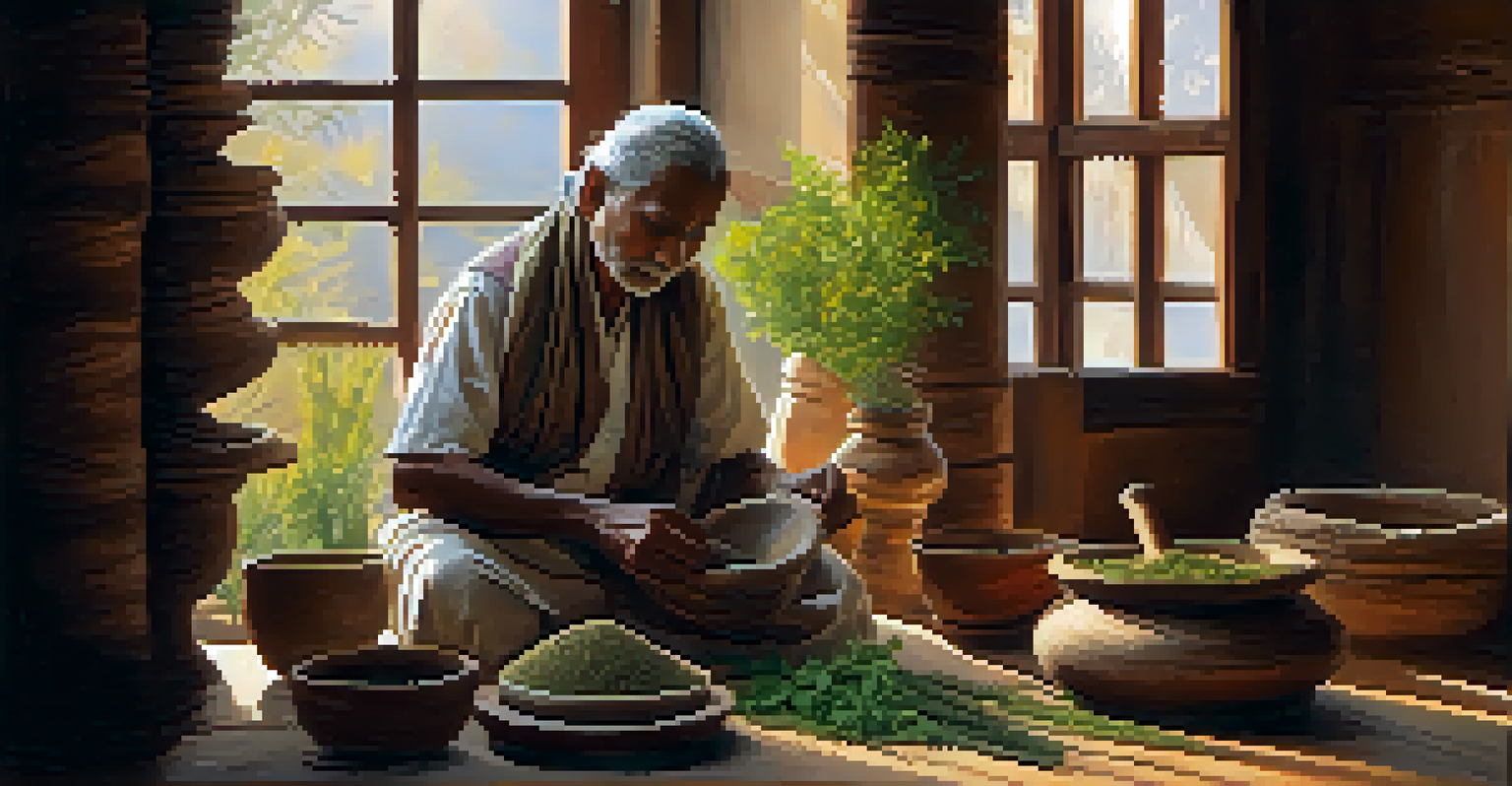Herbal Medicine: The Backbone of Traditional Indian Healing

Understanding Herbal Medicine in Indian Tradition
Herbal medicine has been a cornerstone of traditional Indian healing for thousands of years. Rooted in ancient texts like the Vedas, it emphasizes the use of plants and natural substances to promote health. This form of medicine is not just about treating illness; it’s about achieving balance and harmony within the body.
Herbal medicine is a journey of discovery that connects us to the earth and to ourselves.
In India, herbal remedies are often intertwined with spiritual practices, showcasing a holistic approach to health. Many practitioners believe that physical ailments are connected to emotional and spiritual states, thus advocating for a comprehensive healing process. This perspective makes herbal medicine more than just a remedy; it’s a lifestyle.
Moreover, herbal medicine is deeply embedded in cultural rituals and practices, passed down through generations. Families often have their own traditional remedies for common ailments, emphasizing the community's role in preserving this knowledge. This rich heritage continues to thrive, adapting to modern needs while honoring its roots.
Key Principles of Ayurvedic Herbal Medicine
Ayurveda, one of the oldest medicinal systems in India, forms the foundation of herbal medicine. Its principles revolve around the concept of 'doshas'—Vata, Pitta, and Kapha—which represent different energies within the body. Understanding your dosha helps tailor herbal treatments to restore balance and promote overall well-being.

For instance, someone with a dominant Vata dosha may benefit from warming herbs like ginger and cinnamon, while a Pitta individual might find relief with cooling herbs like mint and chamomile. This personalized approach ensures that herbal medicine addresses not only the symptoms but also the underlying imbalances.
Herbal Medicine's Holistic Approach
Herbal medicine in India emphasizes a holistic healing process that integrates physical, emotional, and spiritual well-being.
Additionally, Ayurveda emphasizes prevention and wellness, encouraging individuals to adopt healthy lifestyles. It teaches that herbal remedies can be used not just for treating ailments but also for maintaining health, highlighting the importance of proactive care in everyday life.
Popular Herbs in Indian Herbal Medicine
There are numerous herbs prized in Indian herbal medicine, each with its unique properties. Turmeric, known for its anti-inflammatory benefits, is often used in various forms, from teas to pastes. Its active compound, curcumin, is celebrated for its healing potential, making it a staple in both kitchens and medicine cabinets.
The greatest wealth is health.
Another well-known herb is Ashwagandha, revered for its adaptogenic properties. It helps the body cope with stress and promotes mental clarity, making it popular among those seeking to enhance their overall vitality. The versatility of these herbs makes them accessible to everyone, from seasoned herbalists to those just starting their journey.
Additionally, Neem is often called the 'village pharmacy' due to its wide range of medicinal uses, from skin health to detoxification. The ability of these herbs to address various ailments showcases the depth and breadth of knowledge within Indian herbal medicine, making it a treasure trove of natural healing.
Modern Applications of Traditional Herbs
While rooted in tradition, herbal medicine is increasingly finding its place in modern healthcare. Many practitioners now integrate these ancient practices with contemporary medicine, recognizing the potential benefits of combining both approaches. This integration reflects a growing awareness of the importance of holistic health in today's fast-paced world.
Research is also shining a spotlight on the efficacy of many traditional herbs, leading to their incorporation into supplements and wellness products. For instance, the popularity of turmeric and Ashwagandha in the global health market demonstrates a shift towards natural remedies. As people seek alternatives to synthetic medications, herbal options are becoming more mainstream.
Ayurveda's Personalized Treatments
Ayurveda's principles of doshas allow for personalized herbal treatments that target both symptoms and underlying imbalances.
Furthermore, educational initiatives and workshops are emerging, aimed at teaching individuals how to use these herbs safely and effectively. This revival not only preserves ancient wisdom but also empowers individuals to take charge of their health through natural means.
The Role of Community in Herbal Medicine
Community plays a vital role in the preservation and practice of herbal medicine. In many villages across India, knowledge about herbal remedies is shared through storytelling and hands-on experience. Elders often pass down their wisdom, ensuring that traditional practices are kept alive for future generations.
These communal practices foster a sense of belonging and connection to one’s roots, emphasizing the importance of collective knowledge. Local healers, often revered in their communities, serve as custodians of this ancient wisdom, offering guidance and support to those seeking natural remedies.
Moreover, community gardens where medicinal herbs are grown are becoming increasingly popular. These gardens not only provide access to fresh herbs but also serve as educational hubs, teaching individuals about the benefits of herbal medicine and how to integrate it into their daily lives.
Challenges Facing Herbal Medicine Today
Despite its rich history and growing popularity, herbal medicine faces several challenges today. One significant issue is the standardization of herbal products, as quality and potency can vary widely. This inconsistency raises concerns about safety and efficacy, making it crucial for consumers to choose reputable sources.
Additionally, the rise of commercialization has led to the commodification of traditional herbs, often stripping them of their cultural significance. As more companies enter the market, there’s a risk that the genuine practices and knowledge surrounding these herbs may be overshadowed by marketing tactics aimed at profit rather than well-being.
Challenges and Future of Herbal Practices
Despite facing challenges like standardization and commercialization, the future of herbal medicine in India looks bright with growing interest in natural health solutions.
Finally, the lack of regulation in many regions can lead to misinformation about the use of herbs, potentially causing harm. Educating consumers and fostering transparency within the industry is essential to ensure that the integrity of herbal medicine is preserved as it continues to evolve.
Future of Herbal Medicine in India
The future of herbal medicine in India looks promising, with a growing interest in natural and holistic health solutions. As more people become aware of the benefits of herbal remedies, there’s a strong push towards integrating these practices into mainstream healthcare. This shift is not just about treating ailments; it's about fostering a culture of preventive care and wellness.
Moreover, advancements in research and technology are paving the way for a deeper understanding of herbal properties. Scientists are increasingly studying the active compounds in these plants, validating traditional uses and opening doors for new applications. This fusion of ancient wisdom and modern science could lead to innovative treatments and therapies.

As the global community embraces a more holistic approach to health, Indian herbal medicine stands to gain recognition on the world stage. By maintaining its roots while adapting to contemporary needs, herbal medicine can continue to thrive, offering valuable insights into sustainable health practices for generations to come.